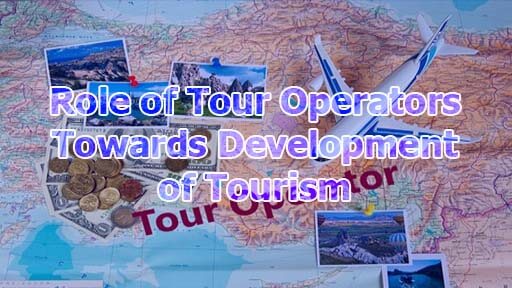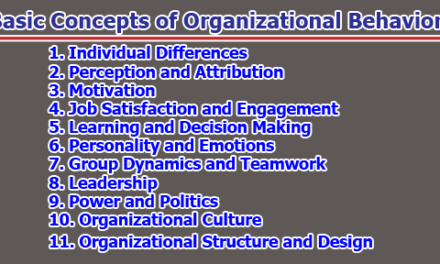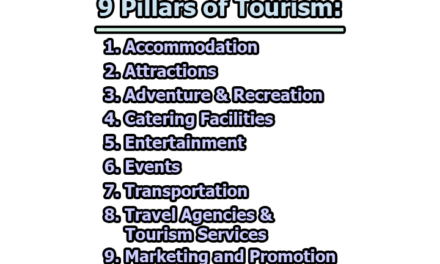Role of Tour Operators towards Development of Tourism:
Acquainted with the role of tour operators in the tourism industry, a tour operator packages together a series of travel services which include transportation, airport transfers, accommodation, excursions and sightseeing, guide services, etc. The product which comes out after assembling all these services together is known as a package tour. Generally, the tour operators buy these services in bulk from the principal suppliers to make a package. The complete package of arrangements and services is then sold at an exclusive package price to clients through retail agents in the tourists for generating markets. At the same time, it must be noted that a tour operator not only sells a package tour but also ensures the smooth operation of tourism. Tour operators are important for conveying destinations’ information to tourists in order to create a wide scope for tourism activities. Without tour operators there would not be any tourism products. Acting as an intermediary, tour operators are a pivotal link between the tourists and the destination. The tour operators’ initiative for sustainable tourism development summarizes the role of tour operators at their destinations. The role of tour operators towards development of tourism is further explained as follows:
- Receiving the tourists at the airport, railway station, or bus stand and taking them to the hotel and vice versa: Tour operators are responsible for receiving tourists at the airport, railway station, or bus stand and taking them to their hotels. This is the first step in ensuring a comfortable and convenient trip for tourists.
- Providing appropriate transport for the tourists to travel in the area: Tour operators arrange appropriate transport for tourists to travel in the area. This could include taxis, buses, or other forms of transportation depending on the needs of the tourists.
- Providing guides for sightseeing tours: Tour operators arrange for local guides to accompany tourists during sightseeing tours. This ensures that tourists get a better understanding of the places they are visiting and can appreciate the local culture and heritage.
- Providing tickets for the entrance fees at places of visit: Tour operators provide tickets for entrance fees at various tourist attractions. This saves time and effort for tourists and ensures that they can easily access the places they want to visit.
- Reconfirming hotel, flight, train, bus reservations, etc.: Tour operators reconfirm hotel, flight, train, and bus reservations to ensure that there are no issues or delays during the trip.
- Helping the tourists in exchange for foreign currency: Tour operators assist tourists in exchanging foreign currency for local currency, making it easier for them to make transactions during their trip.
- Introducing the new tourism destinations to the tourists: Tour operators introduce tourists to new tourism destinations, helping to promote tourism in emerging locations and diversify the tourism industry.
- Providing tour brochures to tourists: Tour operators provide tourists with tour brochures that contain information about the various destinations and activities available during their trip.
- Providing detailed information about the visiting tourism destinations: Tour operators provide detailed information about the various tourist destinations, including their history, culture, and attractions.
- Explaining the importance of visiting destinations including accommodations: Tour operators explain the importance of visiting various destinations and provide information about the accommodations available in those places.
- Arranging the package tour according to the cost of tourists: Tour operators arrange package tours according to the budget of the tourists, making it easier for them to plan their trip.
- Leading the tourists to every destination during the visit: Tour operators lead tourists during their visits to various destinations, ensuring that they are safe and comfortable during their trip.
- Providing safety to the tourists throughout the journey: Tour operators take responsibility for the safety of tourists during their trip, ensuring that they are protected from any risks or dangers.
- Giving suggestions to the government for the development and improvement of infrastructure in tourism destinations: Tour operators provide suggestions to the government on how to improve the infrastructure in various tourist destinations, making it easier for tourists to visit and enjoy these places.
- Approaching the government to develop tourism destinations: Tour operators work with the government to develop new tourism destinations and promote tourism in emerging locations.
- Influencing customers’ choices and behaviors: Tour operators influence customers’ choices and behaviors by promoting certain destinations and activities.
- Directing the flow of tourists: Tour operators direct the flow of tourists to different destinations, helping to prevent overcrowding in certain areas and promoting tourism in other areas.
- Influencing the supply chain: Tour operators influence the supply chain by working with local suppliers to provide goods and services to tourists.
- Influencing the development of destinations: Tour operators influence the development of destinations by promoting certain areas and activities and working with the government and local communities to improve infrastructure and amenities.
- Influencing the well-being of destinations/local communities: Tour operators have a responsibility to ensure that the well-being of destinations and local communities is taken into consideration when promoting tourism. They work to minimize the negative impacts of tourism on local communities and to promote sustainable tourism practices.
- To receive intimation from wholesale operators for planning itineraries both for groups and particularly in his country: Tour operators receive intimation from wholesale operators for planning itineraries for groups and individuals visiting their country.
- Negotiating with road transport to provide taxis/coaches for transport from the airport to the hotel, sightseeing tours, or intercity transportation: Tour operators negotiate with road transport providers to provide taxis and coaches for transportation from the airport to hotels, sightseeing tours, and intercity transportation.
- Negotiating with hotels for reasonable prices for rooms, meals, and other services: Tour operators negotiate with hotels to provide reasonable prices for rooms, meals, and other services to their clients.
- To arrange cheap and best transportation services: Tour operators work to provide cheap and reliable transportation services to their clients, making it easier for them to travel and explore their destinations.
- Negotiating with historical and cultural places for entertainment: Tour operators negotiate with historical and cultural places to provide entertainment for their clients, including cultural shows and other performances.
- Coordinating with various tourist centers for sightseeing tours: Tour operators coordinate with various tourist centers to provide sightseeing tours to their clients, ensuring that they get the most out of their trips.
From the above discussion, we can say that tour operators play a key role in deciding the volume of tourists reaching a destination. They also have direct control over the tourist’s choice of products and create the demand for a destination through their representation of the destination packages.
References:
- Bieger, T., Wittmer, A., & Wittmer, D. (2019). Tourism Management: An Introduction. Channel View Publications.
- Buhalis, D. (2016). Tourism Management: An Introduction. Sage Publications.
- Deepak, K. (2017). Role of Tour Operators in Tourism Development: A Study with Special Reference to Mysore and Dakshina Kannada Districts. Journal of Tourism and Hospitality Management, 5(3), 1-9.
- Hall, C. M., & Page, S. J. (2014). The Routledge Handbook of Tourism Research. Routledge.
- Jenkins, C. L. (2014). The role of tour operators in sustainable tourism development. Journal of Sustainable Tourism, 22(3), 347-364.
- Morrison, A. M. (2013). Marketing and Managing Tourism Destinations. Routledge.
- Papatheodorou, A., Rosselló-Nadal, J., & Xiao, H. (2019). The Routledge Handbook of Transport Economics. Routledge.
- Ritchie, B. W., & Adair, D. (2002). Towards a framework for tourism disaster management. Tourism Management, 23(2), 135-147.
- Sharpley, R., & Telfer, D. J. (2014). Tourism and Development: Concepts and Issues. Channel View Publications.
- Tribe, J., & Airey, D. (2007). Developments in Tourism Research. Elsevier.

Library Lecturer at Nurul Amin Degree College










